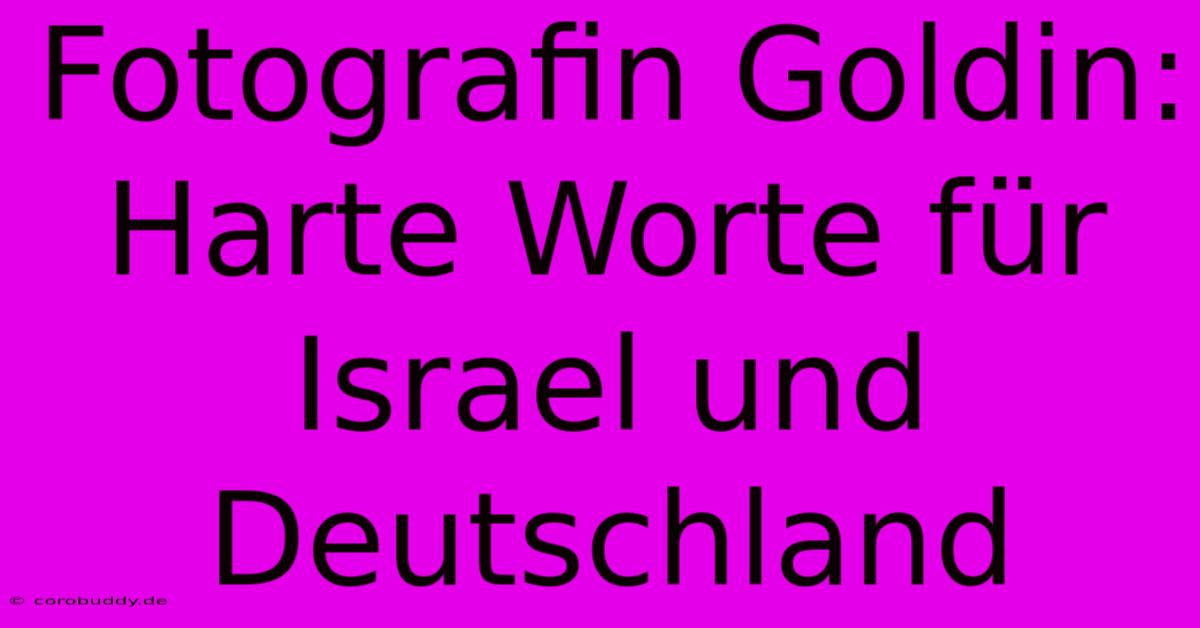Fotografin Goldin: Harte Worte Für Israel Und Deutschland

Discover more detailed and exciting information on our website. Click the link below to start your adventure: Visit Best Website Fotografin Goldin: Harte Worte Für Israel Und Deutschland. Don't miss out!
Table of Contents
Fotografin Nan Goldin: Harte Worte für Israel und Deutschland
Nan Goldin. The name itself evokes powerful images – raw, intimate photographs that pull no punches. But lately, Goldin's known not just for her lens, but for her outspoken criticism of both Israel and Germany. And boy, are her words strong.
I first encountered Goldin's work years ago, in a small gallery tucked away in Berlin. I remember being completely blown away. The vulnerability, the honesty... it felt like a punch to the gut. It was beautiful and brutal all at once. I bought a postcard – a small, slightly blurry image of a couple embracing, shadowed and intense. It's still on my fridge.
But it wasn't until recently that I really dove into her activism. And, wow. It's intense. She's not pulling any punches. Goldin's been incredibly vocal about the Sackler family, their role in the opioid crisis, and their generous donations to museums – museums that, in turn, bear their name. It's a complicated story, full of money, power, and devastating consequences. She's used her platform— and her considerable influence —to really shake things up.
Goldin's Criticism of Israel: A Complex Issue
Her criticism of Israel, though, is a different beast altogether. It's multifaceted, complex, and often draws a lot of heat. She's accused Israel of human rights abuses, particularly in the occupied Palestinian territories. This is a subject that sparks intense debate, and let's be honest, it's a minefield.
I've read countless articles and reports on the Israeli-Palestinian conflict. Trying to understand the nuances, the history, the sheer emotional weight of it all… it's exhausting. There's no simple answer, no easy solution. And frankly, some days I just feel overwhelmed by it all.
One thing's for sure, Goldin's not shy about sharing her perspective, even if it's unpopular. Her involvement in various protests and her public statements clearly demonstrate her unwavering stance. It's a brave – and sometimes controversial – position to take, especially given the sensitivity of the issue.
Germany and the Past: A Shadowy Legacy
Goldin's criticism of Germany isn’t new. It revolves heavily around Germany's past and its ongoing responsibility to confront its history of the Holocaust and its role in World War II. For Goldin, Germany's actions (or lack thereof) in regards to the Sackler family and their opioid crisis is a kind of new, albeit different, moral failing. This is where it gets really interesting.
This isn't a simple matter of criticizing the past. Goldin ties the past to the present, arguing that Germany’s legacy of inaction on certain issues continues to haunt its present-day actions. It’s a difficult argument to unpack but one that she makes with a lot of passion and conviction. She’s not just pointing fingers; she's demanding accountability.
I struggle, though, with how to process all this information. How do you reconcile the beauty of her art with the sometimes-harsh reality of her words? It's a difficult question, one I'm still grappling with. But I think her work, in its entirety – both her photography and her activism – forces us to confront uncomfortable truths. And sometimes, that's exactly what we need.
It's important to remember that interpreting Nan Goldin's work and statements requires careful consideration of the historical, political, and social contexts involved. This is a complex discussion, and there's no single interpretation of her views. Do your own research. Think critically. Form your own opinion. Because that’s what really matters. And that's what makes Goldin's work so powerful.

Thank you for visiting our website wich cover about Fotografin Goldin: Harte Worte Für Israel Und Deutschland. We hope the information provided has been useful to you. Feel free to contact us if you have any questions or need further assistance. See you next time and dont miss to bookmark.
Featured Posts
-
Timo Werner Citys Krise Verschaerft Sich
Nov 24, 2024
-
23 11 Hoffenheim Vs Leipzig Die Meinungen
Nov 24, 2024
-
Nach Dem Bremen Sieg Top Aussagen
Nov 24, 2024
-
Defekte Zapfsaeule Autofahrer In Not
Nov 24, 2024
-
Bundesliga Leipzig Hoffenheim Trotz Handicap
Nov 24, 2024
